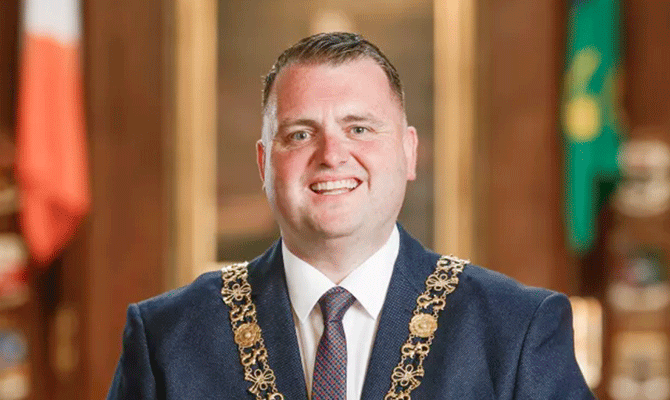
Daithi de Roiste
DUBLIN HAS been infertile territory for Fianna Fáil for some time but the party hopes that the newly elected lord mayor of the city, 35-year-old Ballyfermot councillor Dáithí de Róiste, can reverse the trend of recent years and lead a fight back of sorts in the capital. In May an opinion poll in the Irish Times put party support in Dublin at 15%, an increase on the 12% recorded in February but well below the 40% recorded before FF’s 2011 collapse.
De Róiste is not one of the new trendy FF set but a “constitutional republican” firmly embedded in the working class from which he came. His father works for CIÉ, and his mother, now deceased, worked in the HSE. These are credentials that once mattered in the party.
De Róiste was one of the first of his family to get a third-level education, graduating from UCD with an honours degree in history and from DIT with a masters in public affairs.
The official Dublin City Council statement declares that he has worked in marketing and communications for over a decade in Bord na Móna, Permanent TSB and US healthcare group UPMC, and that the new lord mayor has “also been active in his community since he was a teenager, leading young first aid groups, supporting Irish language youth clubs and GAA clubs, serving on the board of a local primary school, and campaigning on local issues such as suicide prevention”. He is also the honorary president of Ballyfermot United.
De Róiste has been a councillor for nearly 10 years and, before his first election in 2014, he was appointed as a local area representative charged with revitalising the FF local party after the 2011 catastrophe. He was successful in this and developed a high standing in his native Ballyfermot, a key area in the Dublin South Central (DSC) constituency.
De Róiste expected that he would be a candidate for the party in the 2016 election but head office wanted someone more amenable to the middle-class voters whom FF strategists believed were vital for the party’s future. The working class was already being written off as Sinn Féin’s fiefdom.
A similar stance was taken in Dublin West, where David McGuinness, who had re-established FF there, was shunted aside to make way for Jack Chambers (see The Phoenix 31/7/2020).
De Róiste too was refused permission to contest the selection convention as head office insisted on one female candidate being chosen, supposedly because of the gender quota rules. He described the party diktat as “disgusting, degrading and deplorable” as well as “anti-democratic” and threatened legal action, as did some other thwarted would-be candidates.
In the end he accepted the party decision on the promise he would be given a Seanad nomination.
The alternative candidate, senator Catherine Ardagh, however, failed to take a seat in 2016, losing out by 35 votes to People Before Profit’s Bríd Smith for the last seat. Ironically, commentators noted that the final transfers that swung the seat to Smith came from Ballyfermot and working-class candidates, votes that would have benefitted de Róiste more. Omitting him from the list was seen as costing FF a seat.
While de Róiste did get a nomination for the Seanad as agreed, head office put no support behind him – unlike the support it gave to Ardagh – and he polled only 16 votes out of the 296 cast for FF candidates.
While clearly unhappy about being double-crossed so brazenly, Dáithí De Róiste stayed with the party and became an extremely active councillor, serving as chair of the council’s joint policing committee, where he took a strong public line against the “terrorising of the local community” by anti-social youths and denounced the downgrading of the local Garda station.
The next local elections will show what impact his new high profile will have on his vote and on his prospects for the Dáil.
De Róiste is certainly no shoe-in. In 2014 he got less than 9% of the local election vote, which he pushed up to almost 11% in 2019. If he could push that percentage up a bit throughout the constituency he would be in with a real chance, depending on the destination of transfers from either the Greens’ Patrick Costello (his seat is vulnerable) or Fine Gael. A lot will depend on how he handles his term as lord mayor. He needs to make an impact and capture voters’ imagination.
A big factor, of course, is how the constituencies will be redrawn. Will four-seat DSC gain an extra seat or will it be divided between neighbouring seats? This will become apparent later in the summer but, in the meantime, Dáithí De Róiste has the platform he needs.
The fate of Ardagh shows, however, that DSC will be a tough nut to crack. It currently has one SF, one PBP, one left Independent and one Green. SF is expected to take at least two seats next time and possibly three if the constituency gains an extra seat. This is not a good constituency for overtly middle-class party candidates, which is the point de Róiste has made all along.
Ardagh scored 12.7% in 2016 and 11% in 2020. She only just missed out in 2016 and if de Róiste can match that and strengthen the party vote in Ballyfermot he will at the least be there for the final shout.
Of course, what also worries head office is what he will do if he does get there. After the way he was treated there is no love lost between himself and Micheál Martin but, then, most commentators assume that Martin will be moving on to pastures more European, with an EU commissionership a strong possibility.
De Róiste, however, is far stronger on the national question than Martin and has announced his intention to use his mayorship as an opportunity to play a part in preparing for a border poll on Irish unity. He shares Martin’s reluctance to have such a poll before the preparatory work is done but is anxious to get that work started.
In any case, a new FF leader is likely to want a more accommodating attitude to SF, as on the border poll. In this regard, de Róiste has been outspoken in the party in preferring a partnership with SF rather than with FG.
Indeed, on Dublin City Council he recently sided with SF in opposing the end of the eviction ban, arguing that he wanted to be able to “look my friends and family in the eye”.
FF, of course, is desperately in need of young people with potential – in Dublin more so than anywhere else. So, no matter what reservations the middle-class-oriented strategists of head office might have, Dáithí De Róiste is looking more like the only type of future that might save the party from oblivion as its current voting base gets older and older. But is it too late?


















